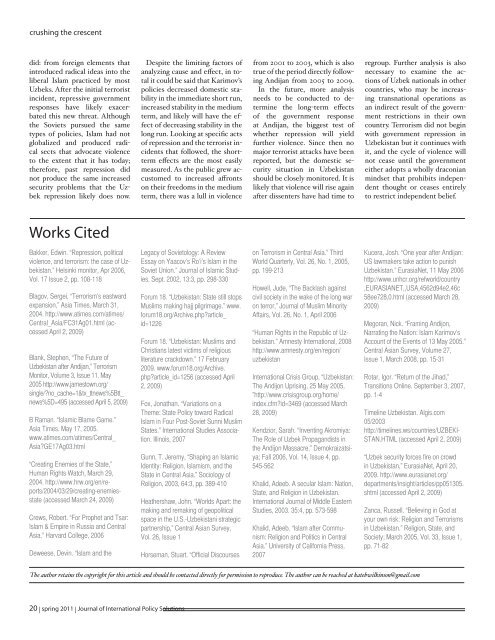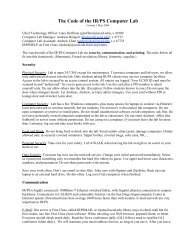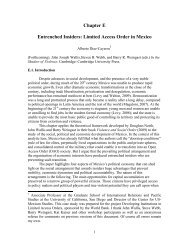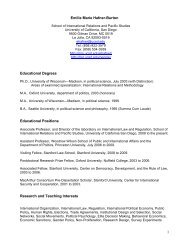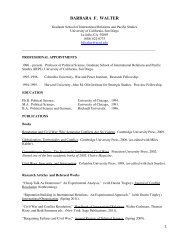to download the full journal. (1.2MB PDF) - School of International ...
to download the full journal. (1.2MB PDF) - School of International ...
to download the full journal. (1.2MB PDF) - School of International ...
Create successful ePaper yourself
Turn your PDF publications into a flip-book with our unique Google optimized e-Paper software.
crushing <strong>the</strong> crescent<br />
did: from foreign elements that<br />
introduced radical ideas in<strong>to</strong> <strong>the</strong><br />
liberal Islam practiced by most<br />
Uzbeks. After <strong>the</strong> initial terrorist<br />
incident, repressive government<br />
responses have likely exacerbated<br />
this new threat. Although<br />
<strong>the</strong> Soviets pursued <strong>the</strong> same<br />
types <strong>of</strong> policies, Islam had not<br />
globalized and produced radical<br />
sects that advocate violence<br />
<strong>to</strong> <strong>the</strong> extent that it has <strong>to</strong>day;<br />
<strong>the</strong>refore, past repression did<br />
not produce <strong>the</strong> same increased<br />
security problems that <strong>the</strong> Uzbek<br />
repression likely does now.<br />
Despite <strong>the</strong> limiting fac<strong>to</strong>rs <strong>of</strong><br />
analyzing cause and effect, in <strong>to</strong>tal<br />
it could be said that Karimov’s<br />
policies decreased domestic stability<br />
in <strong>the</strong> immediate short run,<br />
increased stability in <strong>the</strong> medium<br />
term, and likely will have <strong>the</strong> effect<br />
<strong>of</strong> decreasing stability in <strong>the</strong><br />
long run. Looking at specific acts<br />
<strong>of</strong> repression and <strong>the</strong> terrorist incidents<br />
that followed, <strong>the</strong> shortterm<br />
effects are <strong>the</strong> most easily<br />
measured. As <strong>the</strong> public grew accus<strong>to</strong>med<br />
<strong>to</strong> increased affronts<br />
on <strong>the</strong>ir freedoms in <strong>the</strong> medium<br />
term, <strong>the</strong>re was a lull in violence<br />
from 2001 <strong>to</strong> 2003, which is also<br />
true <strong>of</strong> <strong>the</strong> period directly following<br />
Andijan from 2005 <strong>to</strong> 2009.<br />
In <strong>the</strong> future, more analysis<br />
needs <strong>to</strong> be conducted <strong>to</strong> determine<br />
<strong>the</strong> long-term effects<br />
<strong>of</strong> <strong>the</strong> government response<br />
at Andijan, <strong>the</strong> biggest test <strong>of</strong><br />
whe<strong>the</strong>r repression will yield<br />
fur<strong>the</strong>r violence. Since <strong>the</strong>n no<br />
major terrorist attacks have been<br />
reported, but <strong>the</strong> domestic security<br />
situation in Uzbekistan<br />
should be closely moni<strong>to</strong>red. It is<br />
likely that violence will rise again<br />
after dissenters have had time <strong>to</strong><br />
regroup. Fur<strong>the</strong>r analysis is also<br />
necessary <strong>to</strong> examine <strong>the</strong> actions<br />
<strong>of</strong> Uzbek nationals in o<strong>the</strong>r<br />
countries, who may be increasing<br />
transnational operations as<br />
an indirect result <strong>of</strong> <strong>the</strong> government<br />
restrictions in <strong>the</strong>ir own<br />
country. Terrorism did not begin<br />
with government repression in<br />
Uzbekistan but it continues with<br />
it, and <strong>the</strong> cycle <strong>of</strong> violence will<br />
not cease until <strong>the</strong> government<br />
ei<strong>the</strong>r adopts a wholly draconian<br />
mindset that prohibits independent<br />
thought or ceases entirely<br />
<strong>to</strong> restrict independent belief.<br />
Works Cited<br />
Bakker, Edwin. “Repression, political<br />
violence, and terrorism: <strong>the</strong> case <strong>of</strong> Uzbekistan.”<br />
Helsinki moni<strong>to</strong>r, Apr 2006,<br />
Vol. 17 Issue 2, pp. 108-118<br />
Blagov, Sergei, “Terrorism’s eastward<br />
expansion,” Asia Times, March 31,<br />
2004. http://www.atimes.com/atimes/<br />
Central_Asia/FC31Ag01.html (accessed<br />
April 2, 2009)<br />
Blank, Stephen, “The Future <strong>of</strong><br />
Uzbekistan after Andijan,” Terrorism<br />
Moni<strong>to</strong>r, Volume 3, Issue 11. May<br />
2005 http://www.james<strong>to</strong>wn.org/<br />
single/?no_cache=1&tx_ttnews%5Btt_<br />
news%5D=495 (accessed April 5, 2009)<br />
B Raman. “Islamic Blame Game.”<br />
Asia Times. May 17, 2005.<br />
www.atimes.com/atimes/Central_<br />
Asia?GE17Ag03.html<br />
“Creating Enemies <strong>of</strong> <strong>the</strong> State,”<br />
Human Rights Watch, March 29,<br />
2004. http://www.hrw.org/en/reports/2004/03/29/creating-enemiesstate<br />
(accessed March 24, 2009)<br />
Crews, Robert. “For Prophet and Tsar:<br />
Islam & Empire in Russia and Central<br />
Asia.” Harvard College, 2006<br />
Deweese, Devin. “Islam and <strong>the</strong><br />
Legacy <strong>of</strong> Sovie<strong>to</strong>logy: A Review<br />
Essay on Yaacov’s Ro’i’s Islam in <strong>the</strong><br />
Soviet Union.” Journal <strong>of</strong> Islamic Studies,<br />
Sept. 2002, 13:3, pp. 298-330<br />
Forum 18. “Uzbekistan: State still s<strong>to</strong>ps<br />
Muslims making hajj pilgrimage.” www.<br />
forum18.org/Archive.php?article_<br />
id=1226<br />
Forum 18. “Uzbekistan: Muslims and<br />
Christians latest victims <strong>of</strong> religious<br />
literature crackdown.” 17 February<br />
2009. www.forum18.org/Archive.<br />
php?article_id=1256 (accessed April<br />
2, 2009)<br />
Fox, Jonathan. “Variations on a<br />
Theme: State Policy <strong>to</strong>ward Radical<br />
Islam in Four Post-Soviet Sunni Muslim<br />
States.” <strong>International</strong> Studies Association.<br />
Illinois, 2007<br />
Gunn, T. Jeremy, “Shaping an Islamic<br />
Identity: Religion, Islamism, and <strong>the</strong><br />
State in Central Asia.” Sociology <strong>of</strong><br />
Religion, 2003, 64:3, pp. 389-410<br />
Hea<strong>the</strong>rshaw, John. “Worlds Apart: <strong>the</strong><br />
making and remaking <strong>of</strong> geopolitical<br />
space in <strong>the</strong> U.S.-Uzbekistani strategic<br />
partnership,” Central Asian Survey,<br />
Vol. 26, Issue 1<br />
Horseman, Stuart. “Official Discourses<br />
on Terrorism in Central Asia.” Third<br />
World Quarterly, Vol. 26, No. 1, 2005,<br />
pp. 199-213<br />
Howell, Jude, “The Backlash against<br />
civil society in <strong>the</strong> wake <strong>of</strong> <strong>the</strong> long war<br />
on terror,” Journal <strong>of</strong> Muslim Minority<br />
Affairs, Vol. 26, No. 1, April 2006<br />
“Human Rights in <strong>the</strong> Republic <strong>of</strong> Uzbekistan.”<br />
Amnesty <strong>International</strong>, 2008<br />
http://www.amnesty.org/en/region/<br />
uzbekistan<br />
<strong>International</strong> Crisis Group, “Uzbekistan:<br />
The Andijon Uprising, 25 May 2005,<br />
”http://www.crisisgroup.org/home/<br />
index.cfm?id=3469 (accessed March<br />
28, 2009)<br />
Kendzior, Sarah. “Inventing Akromiya:<br />
The Role <strong>of</strong> Uzbek Propagandists in<br />
<strong>the</strong> Andijon Massacre,” Demokraizatsiya;<br />
Fall 2006, Vol. 14, Issue 4, pp.<br />
545-562<br />
Khalid, Adeeb. A secular Islam: Nation,<br />
State, and Religion in Uzbekistan.<br />
<strong>International</strong> Journal <strong>of</strong> Middle Eastern<br />
Studies, 2003. 35:4, pp. 573-598<br />
Khalid, Adeeb. “Islam after Communism:<br />
Religion and Politics in Central<br />
Asia.” University <strong>of</strong> California Press,<br />
2007<br />
Kucera, Josh. “One year after Andijan:<br />
US lawmakers take action <strong>to</strong> punish<br />
Uzbekistan.” EurasiaNet, 11 May 2006<br />
http://www.unhcr.org/refworld/country<br />
,EURASIANET,,USA,4562d94e2,46c<br />
58ee728,0.html (accessed March 28,<br />
2009)<br />
Megoran, Nick. “Framing Andijon,<br />
Narrating <strong>the</strong> Nation: Islam Karimov’s<br />
Account <strong>of</strong> <strong>the</strong> Events <strong>of</strong> 13 May 2005.”<br />
Central Asian Survey, Volume 27,<br />
Issue 1, March 2008, pp. 15-31<br />
Rotar, Igor. “Return <strong>of</strong> <strong>the</strong> Jihad,”<br />
Transitions Online. September 3, 2007,<br />
pp. 1-4<br />
Timeline Uzbekistan. Algis.com<br />
05/2003<br />
http://timelines.ws/countries/UZBEKI-<br />
STAN.HTML (accessed April 2, 2009)<br />
“Uzbek security forces fire on crowd<br />
in Uzbekistan,” EurasiaNet, April 20,<br />
2009. http://www.eurasianet.org/<br />
departments/insight/articles/pp051305.<br />
shtml (accessed April 2, 2009)<br />
Zanca, Russell. “Believing in God at<br />
your own risk: Religion and Terrorisms<br />
in Uzbekistan.” Religion, State, and<br />
Society; March 2005, Vol. 33, Issue 1,<br />
pp. 71-82<br />
The author retains <strong>the</strong> copyright for this article and should be contacted directly for permission <strong>to</strong> reproduce. The author can be reached at katebwilkinson@gmail.com<br />
20 | spring 2011 | Journal <strong>of</strong> <strong>International</strong> Policy Solutions


